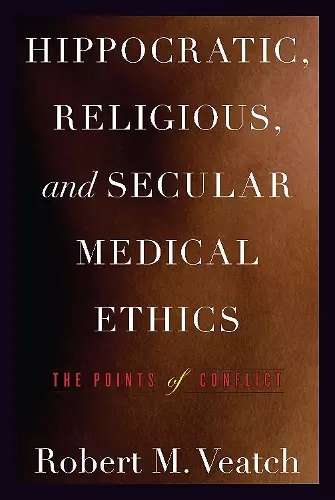Hippocratic, Religious, and Secular Medical Ethics
The Points of Conflict
Format:Paperback
Publisher:Georgetown University Press
Published:9th Oct '12
Currently unavailable, and unfortunately no date known when it will be back

"A provocative and challenging starting point for discussion about the foundations of medical ethics."
Where should physicians get their ethics? While the Hippocratic Oath continues to be cited by a wide array of professional associations, scholars, and medical students, the author contends that the pledge is such an offensive code of ethics that it should be summarily excised from the profession.Where should physicians get their ethics? Professional codes such as the Hippocratic Oath claim moral authority for those in a particular field, yet according to medical ethicist Robert Veatch, these codes have little or nothing to do with how members of a guild should understand morality or make ethical decisions. While the Hippocratic Oath continues to be cited by a wide array of professional associations, scholars, and medical students, Veatch contends that the pledge is such an offensive code of ethics that it should be summarily excised from the profession. What, then, should serve as a basis for medical morality? Building on his recent contribution to the prestigious Gifford Lectures, Veatch challenges the presumption that professional groups have the authority to declare codes of ethics for their members. To the contrary, he contends that role-specific duties must be derived from ethical norms having their foundations outside the profession, in religious and secular convictions. Further, these ethical norms must be comprehensible to lay people and patients. Veatch argues that there are some moral norms shared by most human beings that reflect a common morality, and ultimately it is these generally agreed-upon religious and secular ways of knowing - thus far best exemplified by the 2005 Universal Declaration on Bioethics and Human Rights - that should underpin the morality of all patient-professional relations in the field of medicine. "Hippocratic, Religious, and Secular Medical Ethics" is the magnum opus of one of the most distinguished medical ethicists of his generation.
Veatch is instantly recognizable to all specialists in the field of bioethics as the leading and long-term opponent of the effort of the Hippocratic tradition across two millennia to locate medical ethics solely within the medical guild and to assert the guild's right and duty to define - for both professionals and their patients ... It is the author's magnum opus on medical ethics set within a scholarly, historical framework. America Magazine A provocative and challenging starting point for discussion about the foundations of medical ethics. Ethics and Medicine Hippocratic, Religious, and Secular Medical Ethics is one of those books that provides us with a bigger picture of our everyday narrow topic of interest in the field of medical ethics. Fundamental questions lead us to the sources of the most important points of conflict in this field. Veatch does not leave us with these questions but suggests interesting solutions. The book is definitely worth reading. Medicine, Health Care and Philosophy In many ways, the core argument of the book is what may be his most significant contribution to medical ethics: what Veatch describes as the problem of the generalization of expertize. Health Progress This is an important book for clinicians and all teachers of professional ethics, not only medical ethics. Choice
ISBN: 9781589019461
Dimensions: unknown
Weight: 363g
208 pages